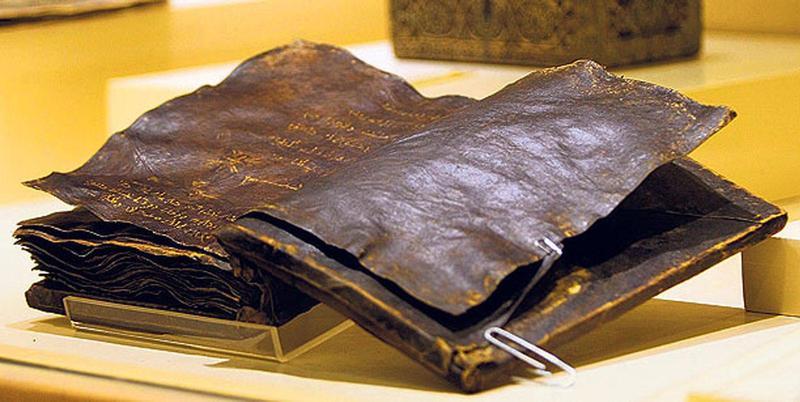An Ancient, Millenia-Old Bible Discovered in Turkey
An Ancient, Millenia-Old Bible Discovered in Turkey
A 1,000-year-old bible was uncovered by police in Turkey after smugglers tried to sell the priceless book to undercover officers.
Police inside the central Turkish city of Tokat confiscated the ancient Bible, along with other priceless artifacts, after they caught smugglers red-handed. In 2015 the three men who were trying to sell the Bible that was written in the old Assyriac language have been arrested. Police also seized 53 ancient coins, jewelry, parts of valuable rings, and two arrowheads.
This Bible has been estimated to be about 1,000 years old, and is illustrated with religious motifs that were formed from gold leaf.
It’s not known where the Bible originated; it has only 51 pages left, and the cover is very damaged. Yet, the pictures created of gold leaf with religious motifs inside of the Bible are still intact, according to the police.
Theologians are now hoping the Bible is going to offer valuable insights into the way Christianity has developed over the past century.
Tokat has appeared in recent years as a center of smuggling activities in uncommon artifacts, a reputation that had been cemented last year with “Orphan Man, Standing”. This was an authentic oil painting by Van Gogh, discovered in the trunk of a vehicle owned by a suspected artifact smuggler.
The exciting news of this finding comes as the world’s oldest bible goes on display at London’s British Museum. The exhibit is titled “Egypt: Faith after the Pharaohs” and has 200 objects that trace Egypt’s religious evolution from the country’s integration into the Roman Empire in 30 BC to the descent of the Islamic Fatimid dynasty in the year of 1171. One of the highlights was part of the 4th century Codex Sinaiticus, a book written in Greek on animal skin by monks on the Mount Sinai. This volume contained the oldest complete copy of the New Testament.
The oldest surviving copy of Scripture is dated to the 2nd century, between the years of 101 and 200 AD.
During July of this year, Israeli archaeologists declared that they have discovered a rare inscription of the name of an influential person that was from the time of King David.
This name was also mentioned in the Bible. The researchers discovered a 3,000-year-old ceramic jar inscribed with the name “Eshbaal Ben Beda”; this name is mentioned in the Old Testament in 1 Chronicles, 8:33 and 9:39.
Archaeologists Saar Ganor and Yosef Garfinkel have expressed their doubts, yet the jar belonged to the same Eshbaal that was mentioned in the Bible.
Who knows what the archaeologists will be able to find out about this 1,000-year-old Bible? Only time will tell us the secrets behind this language.
Be the first to post a message!
